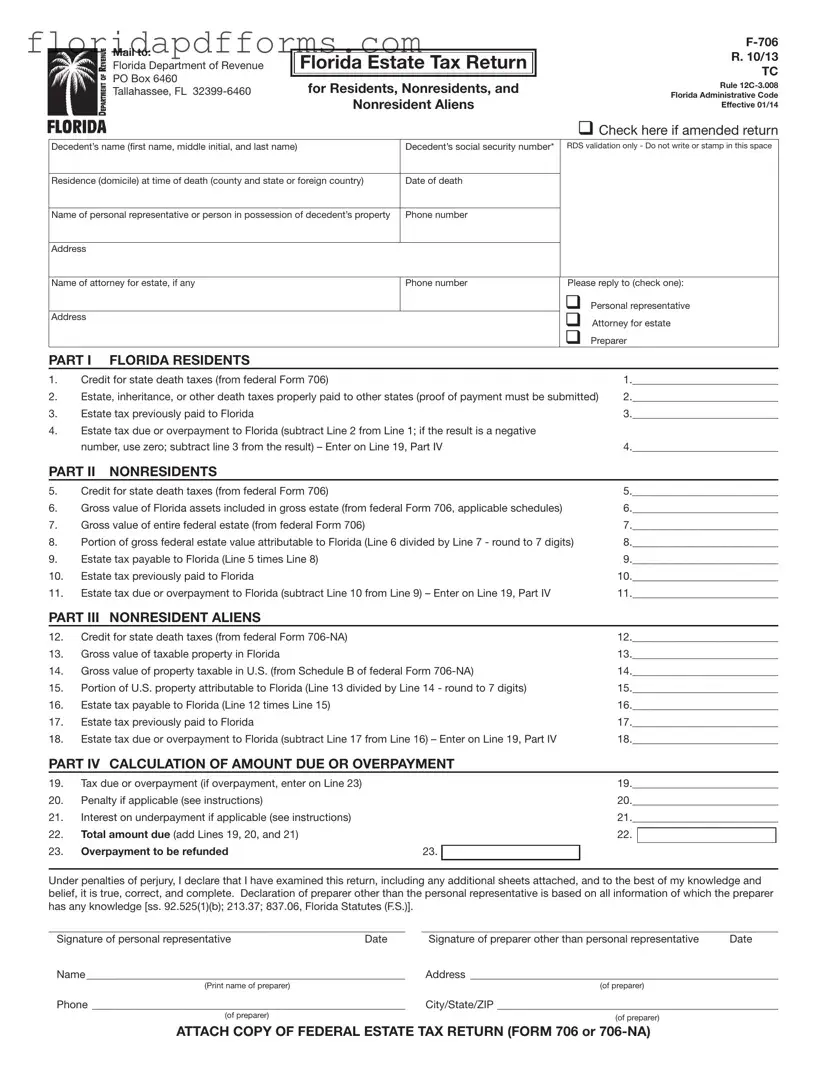General Information
Florida’s estate tax is based on the allowable federal credit for state death taxes. Florida tax is imposed only on those estates subject to federal estate tax filing requirements and entitled to a credit for state death taxes (Chapter 198, F.S.). Estate tax is not due if a federal estate tax return (Form 706 or 706-NA) is not required to be filed. (When estate tax is not due because there is no federal estate tax filing requirement, you should use Florida Form DR-312, Affidavit of No Florida Estate Tax Due, to remove the Florida estate tax lien on the property.) If a nontaxable certificate is requested, you must pay a $5.00 fee for it.
Form F-706 Filing Requirements
The requirement to file Form F-706 depends upon the date of death.
Date of Death |
F-706 Required? |
|
|
On or before December 31, 2004 |
Yes** |
|
|
On or after January 1, 2005 |
No |
|
|
**If required, Form F-706 must be filed for the estate of every Florida resident, nonresident, and nonresident alien with Florida property that is required to file a federal estate tax return (Form 706 or Form 706-NA). The personal representative must attach a signed copy of federal Form 706 or 706-NA to the Florida estate tax return.
Due Dates and Extensions of Time
Form F-706 and payment is due within 9 months after the decedent’s death (when the federal estate tax return is due). If you need an extension of time to file or pay, you must send your request to the Internal Revenue Service (IRS). Florida does not have a separate extension form. We will grant the same extension to pay or file that the IRS does; however, you must send copies of both the extension request and approved federal extension to
us within 30 days of mailing the request and 30 days of receiving the federal approval. An extension of time to file does not extend the time to pay. Interest accrues on the Florida tax due from the original due date until paid.
Tax Paid to Other States
For Florida residents: if estate, inheritance, or other death taxes were properly paid to other states, proof of payment must be submitted to the Florida Department of Revenue. (Proof of payment means the final certificate of payment showing the specific amounts of tax, penalty, or interest assessed and paid.)
*Social Security Numbers
Social security numbers (SSNs) are used by the Florida Department of Revenue as unique identifiers for the administration of Florida’s taxes. SSNs obtained for tax administration purposes are confidential under sections 213.053 and 119.071, Florida Statutes, and not subject to disclosure as public records. Collection of your SSN is authorized under state and federal law. Visit our Internet
site at floridarevenue.com and select “Privacy Notice” for more information regarding the state and federal law governing the collection, use, or release of SSNs, including authorized exceptions.
Where to File
Mail your completed F-706 and payment to: Florida Department of Revenue PO Box 6460
Tallahassee, FL 32399-6460
If you are requesting a nontaxable certificate, include the $5.00 fee.
Signature
The personal representative must sign the return declaration under penalties of perjury. If someone else prepares the return, the preparer must also sign the return.
Amending Form F-706
If you must change a return that has already been filed, you must complete another Form F-706 and check the amended return box on the form. If the amended return is caused by a change in your federal Form 706 or 706-NA, you must attach a statement describing the reasons and all documents related to the change, including correspondence received from the IRS and/or the amended federal Form 706 or 706-NA.
Penalties and Interest
Penalties – If tax is not paid by the due date (or approved extension date) a late payment penalty of 10% of the unpaid tax is due. After 30 days, the late penalty increases to 20%. An added penalty of 10% per month up to a maximum of 50% of the tax due is imposed if the unpaid tax is due to negligence or intentional disregard. A fraud penalty of 100% of the tax due is imposed if the unpaid tax is due to willful intent to defraud. However, the Department of Revenue is authorized to compromise or settle these penalties pursuant to section 213.21, F.S.
Interest – Interest is due on late payments from the due date until paid. Interest rates are updated January 1 and July 1 of each year. To obtain current interest rates, visit our website at floridarevenue.com.
Need Assistance?
Information and forms are available on our Internet site at
floridarevenue.com.
If you have any questions, you may contact Taxpayer Services at 850-488-6800, Monday through Friday, excluding holidays.
For a written reply to your tax questions, write:
Taxpayer Services MS 3-2000
Florida Department of Revenue
5050 W Tennessee St
Tallahassee, FL 32399-0112
For federal estate tax information or forms, visit the IRS website at www.irs.gov.


